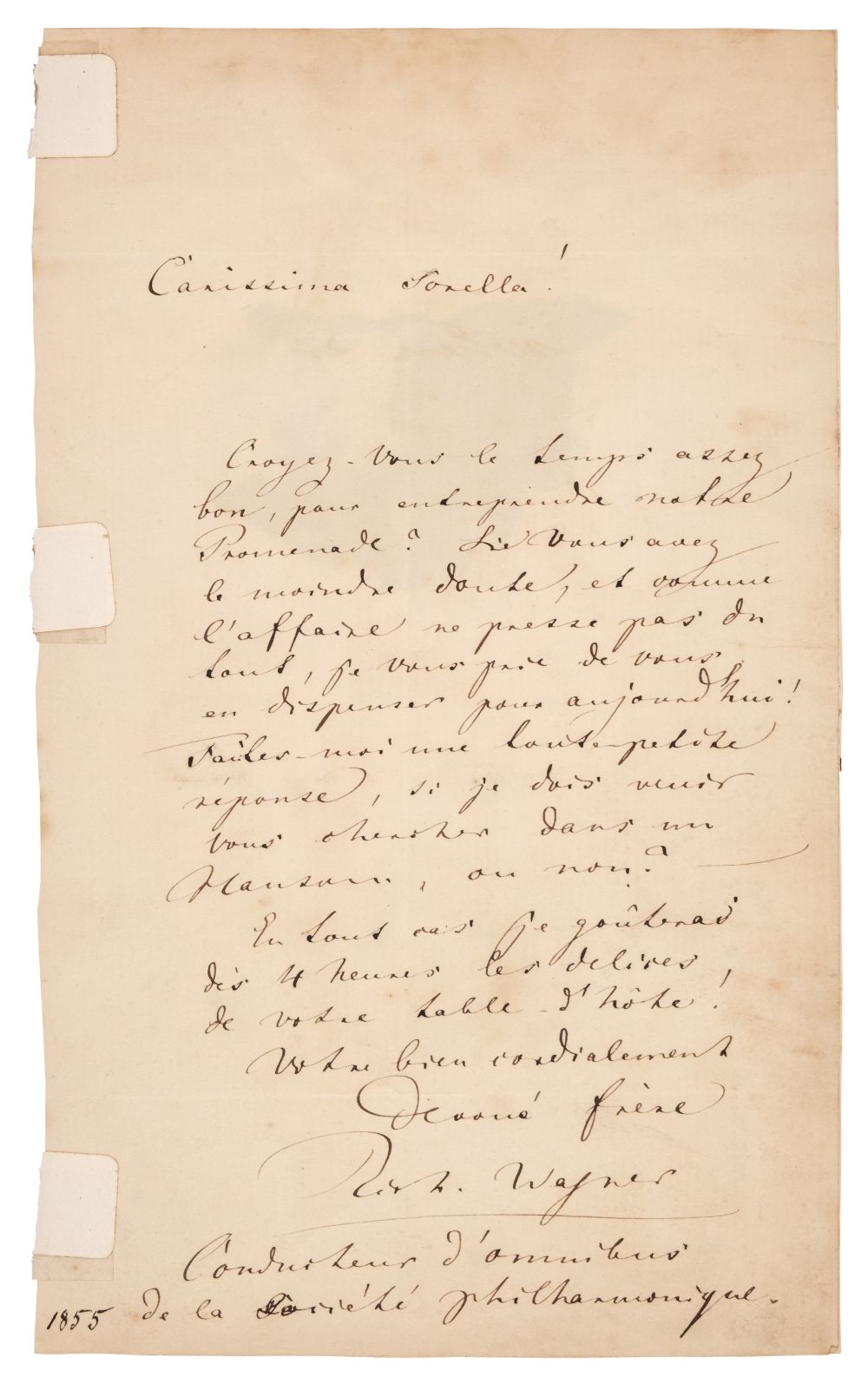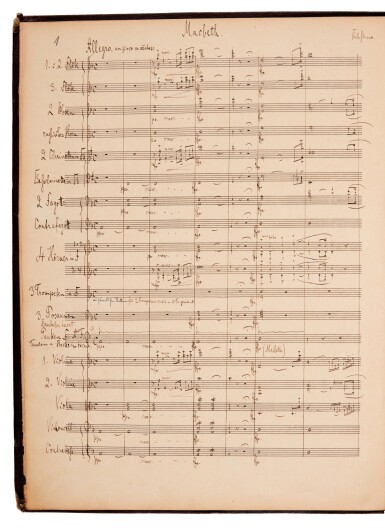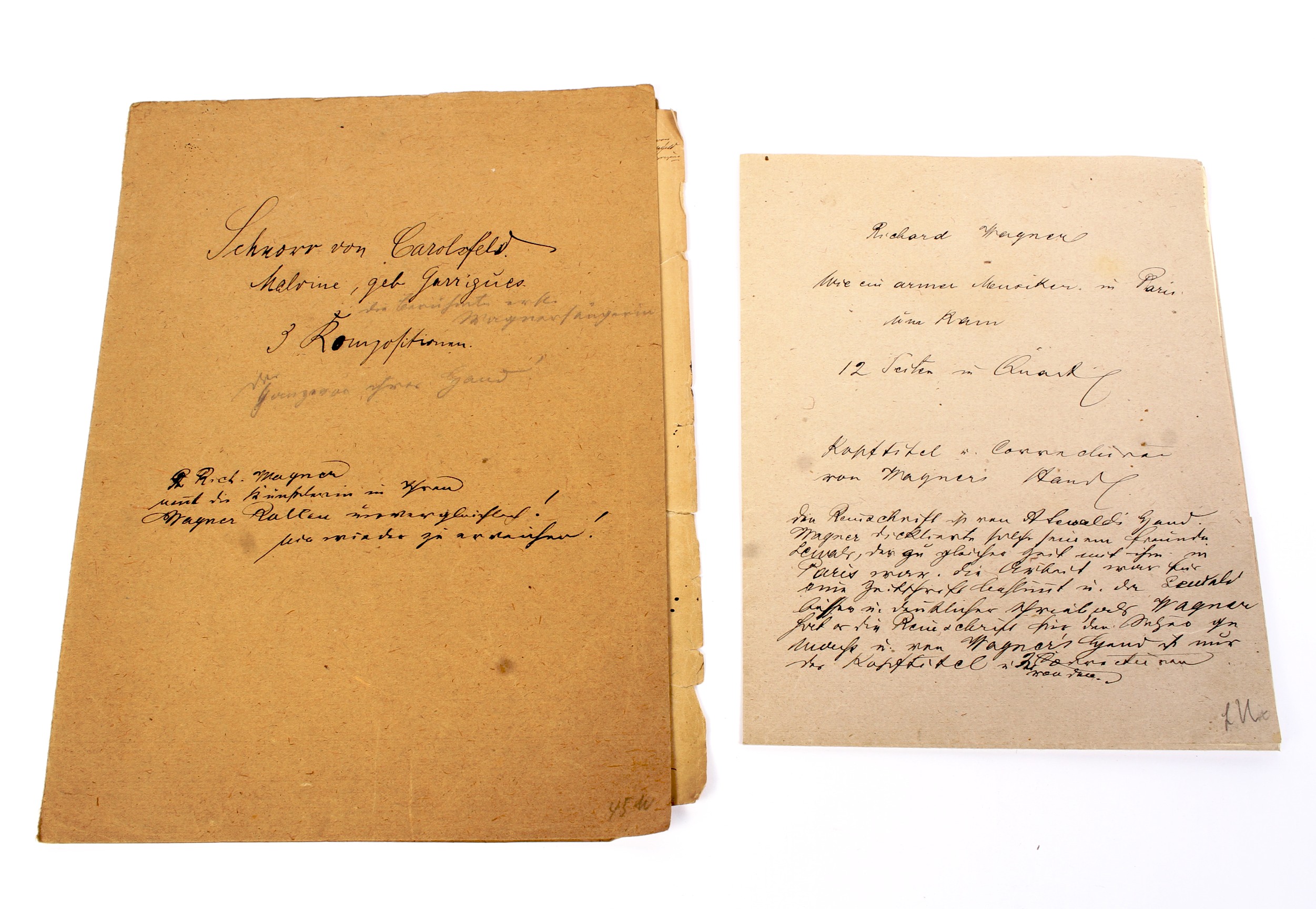MUSIC]. WAGNER, Richard (1813-1883), composer . Autograph letter signed ("RW"), to Judith Gautier, [Bayreuth], [28 November 1877]. 1 page, 4to, with original autographed envelope stamped and postmarked ("Bayreuth, 28 November 1877") , WITH INTACT WAX SEAL, in a giltwood frame . A LOVE LETTER TO THE JUDITH GAUTIER, WHO INSPIRED HIS LAST GREAT OPERATIC MASTERPIECE "PARSIFAL" Wagner passionately declares his love for Judith -- "Et je t'aime. Ceci est vrai, et restera vérité! Oh, chère âme! Douce amie!" -- and chides her for not visiting him in Bayreuth, for her presence would surely have revived his ill health and fatigue. He reveals that he has some concerts planned for the following week and also mentions that he has received word from Benedictus (Judith's lover), which prompts the composer to rhetorically ask whether he would be forgiven for loving Judith. An intimacy between Wagner and the French writer Judith Gautier Mendès (best known for her novel La Fille du Ciel (1911) continued from the time of the 1876 Bayreuth music festival (at which Götterdämmerung was premièred) until February 1878, when it was brought firmly but diplomatically to a halt by Cosima. During this period, Wagner was working on his last opera Parsifal (text finished in 1877, music in 1882), which he called a "festival of consecration in a theatre." Divorced from her husband, the poet Catulle Mendès, Gautier lived with her lover Ludwig Benedictus in Paris. The postmark on the letter, 28 November, is a poignant reminder of an anniversary kept by Wagner and Cosima of the day in 1863 that they "vowed to belong entirely to each other;" ironically here it is the day which marks Wagner's expression of love to another woman. The presence of the wax seal on the envelope is unusual for Wagner, and perhaps an indication of the sensitivity of the contents of the letter. Wagner's further attempts at discretion are evidenced by the lack of any opening salutation naming the recipient, his use of initials instead of a full name, and the absence of place and date.
MUSIC]. WAGNER, Richard (1813-1883), composer . Autograph letter signed ("RW"), to Judith Gautier, [Bayreuth], [28 November 1877]. 1 page, 4to, with original autographed envelope stamped and postmarked ("Bayreuth, 28 November 1877") , WITH INTACT WAX SEAL, in a giltwood frame . A LOVE LETTER TO THE JUDITH GAUTIER, WHO INSPIRED HIS LAST GREAT OPERATIC MASTERPIECE "PARSIFAL" Wagner passionately declares his love for Judith -- "Et je t'aime. Ceci est vrai, et restera vérité! Oh, chère âme! Douce amie!" -- and chides her for not visiting him in Bayreuth, for her presence would surely have revived his ill health and fatigue. He reveals that he has some concerts planned for the following week and also mentions that he has received word from Benedictus (Judith's lover), which prompts the composer to rhetorically ask whether he would be forgiven for loving Judith. An intimacy between Wagner and the French writer Judith Gautier Mendès (best known for her novel La Fille du Ciel (1911) continued from the time of the 1876 Bayreuth music festival (at which Götterdämmerung was premièred) until February 1878, when it was brought firmly but diplomatically to a halt by Cosima. During this period, Wagner was working on his last opera Parsifal (text finished in 1877, music in 1882), which he called a "festival of consecration in a theatre." Divorced from her husband, the poet Catulle Mendès, Gautier lived with her lover Ludwig Benedictus in Paris. The postmark on the letter, 28 November, is a poignant reminder of an anniversary kept by Wagner and Cosima of the day in 1863 that they "vowed to belong entirely to each other;" ironically here it is the day which marks Wagner's expression of love to another woman. The presence of the wax seal on the envelope is unusual for Wagner, and perhaps an indication of the sensitivity of the contents of the letter. Wagner's further attempts at discretion are evidenced by the lack of any opening salutation naming the recipient, his use of initials instead of a full name, and the absence of place and date.











Testen Sie LotSearch und seine Premium-Features 7 Tage - ohne Kosten!
Lassen Sie sich automatisch über neue Objekte in kommenden Auktionen benachrichtigen.
Suchauftrag anlegen